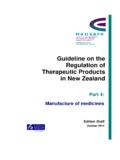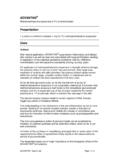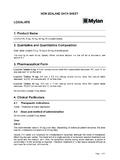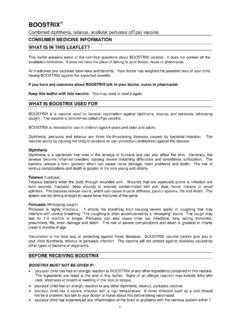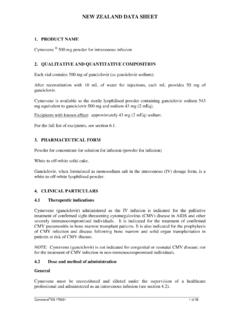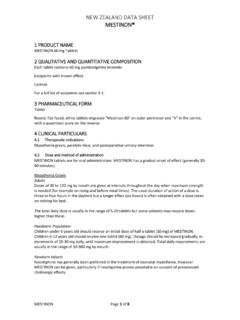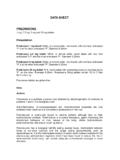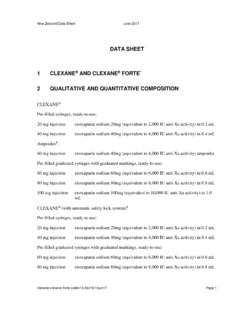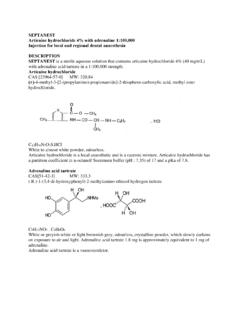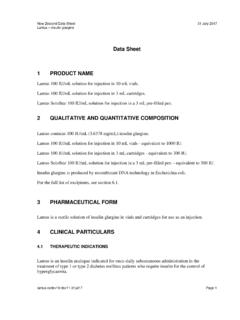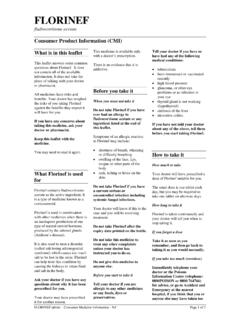Transcription of 1. PRODUCT NAME 2. QUALITATIVE AND ... - Medsafe Home …
1 florinef tablets New Zealand Data Sheet Page 1 of 10 NEW ZEALAND DATA SHEET 1. PRODUCT NAME florinef tablet mg 2. QUALITATIVE AND QUANTITATIVE COMPOSITION florinef tablets contain mg of fludrocortisone acetate as the active ingredient. Fludrocortisone acetate is a white to pale yellow, odourless or almost odourless, crystalline powder. Practically insoluble in water; soluble 1 in 50 in alcohol, 1 in 50 in chloroform; slightly soluble in ether. For the full list of excipients, see section 3. PHARMACEUTICAL FORM florinef is a white, uncoated tablet with a score line on one side and SQUIBB 429" on the other side.
2 4. CLINICAL PARTICULARS Therapeutic indications Partial replacement therapy for primary adrenocortical insufficiency in Addison's disease and for the treatment of salt losing adrenogenital syndrome. 4. 2 Dose and method of administration Addison's disease The combination of florinef with a glucocorticoid such as hydrocortisone or cortisone provides substitution therapy approximating normal adrenal activity with minimal risks of unwanted effects. The usual dose is mg of florinef daily, although dosage ranging from mg three times a week to mg daily has been employed. In the event transient hypertension develops as a consequence of therapy, the dose should be reduced to mg daily.
3 florinef is preferably administered in conjunction with cortisone (10 to mg daily in divided doses) or hydrocortisone (10 to 30 mg daily in divided doses). Salt-losing adrenogenital syndrome The recommended dosage is to mg of florinef daily. 4. 3 Contraindications Patients with systemic fungal infections. florinef tablets New Zealand Data Sheet Page 2 of 10 Patients with suspected or known hypersensitivity to fludrocortisone or any on the inactive ingredients. Patients on high dose florinef should not be administered live vaccines as the antibody response will be reduced (see section Special warnings and precautions for use).
4 4. 4 Special warnings and precautions for use Because of its marked effect on sodium retention, the use of florinef in the treatment of conditions other than those indicated herein is not advised. Corticosteroids may mask some signs of infection, and new infections may appear during their use. There may be decreased resistance and inability to localise infection when corticosteroids are used. If an infection occurs during fludrocortisone acetate therapy, it should be promptly controlled by suitable antimicrobial therapy. Chicken pox, measles, herpes zoster, or threadworm infestations for example, can have a more serious or even fatal course in non-immune children or adults on corticosteroids.
5 Visual disturbance Visual disturbance may be reported with systemic and topical corticosteroid use. If a patient presents with symptoms such as blurred vision or other visual disturbances, the patient should be considered for referral to an ophthalmologist for evaluation of possible causes which may include cataract, glaucoma or rare diseases such as central serous chorioretinopathy (CSCR) which have been reported after use of systemic and topical corticosteroids. Prolonged use of corticosteroids may produce posterior subcapsular cataracts, glaucoma with possible damage to the optic nerves, and may enhance the establishment of secondary ocular infections due to fungi or viruses.
6 Average and large doses of hydrocortisone or cortisone can cause elevation of blood pressure, salt and water retention, and increased potassium excretion. These effects are less likely to occur with the synthetic derivatives except when used in large doses. However, since fludrocortisone acetate is a potent mineralocorticoid, both the dosage and salt intake should be carefully monitored in order to avoid the development of hypertension, oedema or weight gain. florinef should not be used in patients with uncontrolled congestive heart failure. Periodic checking of serum electrolyte levels is advisable during prolonged therapy; dietary salt restriction and potassium supplementation may be necessary.
7 All corticosteroids increase calcium excretion, which may predispose to osteoporosis or aggravate preexisting osteoporosis. Vaccination florinef tablets New Zealand Data Sheet Page 3 of 10 Live vaccines are contraindicated in patients taking high doses of florinef (see section Contraindications). Live vaccines may, however, be administered to patients on maintenance therapy, although there may be a reduced response. Killed or inactivated vaccines do not represent a danger to immunocompromised patients and generally should be administered as for healthy children. However, there may be a reduced response. The use of florinef in patients with active tuberculosis should be restricted to those cases of fulminating or disseminated tuberculosis in which the corticosteroid is used for the management of the disease in conjunction with an appropriate antituberculous regimen.
8 If corticosteroids are indicated in patients with latent tuberculoses or tuberculin reactivity, close observation is necessary since reactivation of the disease may occur. During prolonged corticosteroid therapy, these patients should receive chemoprophylaxis. Adverse reactions to corticosteroids may be produced by too rapid withdrawal or by continued use of large doses. To avoid drug induced adrenal insufficiency, supportive dosage may be required in times of stress (such as trauma, surgery or severe illness), both during treatment with fludrocortisone acetate and for a year afterwards. There is an enhanced corticosteroid effect in patients with hypothyroidism and in those with cirrhosis.
9 Corticosteroids should be used cautiously in patients with ocular Herpes simplex because of possible corneal perforation. The lowest possible dose of corticosteroid should be used to control the condition being treated. A gradual reduction in dosage should be made when possible. Psychiatric disturbances may appear when corticosteroids are used. These may range from euphoria, insomnia, mood swings, personality changes, and severe depression to frank psychotic tendencies may also be aggravated by corticosteroids. Aspirin should be used cautiously in conjunction with corticosteroids in patients with hypoprothrombinaemia.
10 The use of antidepressant drugs does not relieve and may exacerbate adreno-corticosteroid induced mental disturbances. Corticosteroids should be used with caution in patients with nonspecific ulcerative colitis if there is a probability of impending perforation, abscess, or other pyogenic infection. Corticosteroids should also be used cautiously in patients with diverticulitis, fresh intestinal anastomoses, active or latent peptic ulcer, renal insufficiency, hypertension, osteoporosis, acute glomerulonephritis, vaccinia, varicella, exanthema, Cushing's syndrome, antibiotic resistant infections, diabetes mellitus, congestive heart failure, chronic nephritis, thromboembolic tendencies, thrombophlebitis, convulsive disorders, metastatic carcinoma and florinef tablets New Zealand Data Sheet Page 4 of 10 myasthenia gravis.
